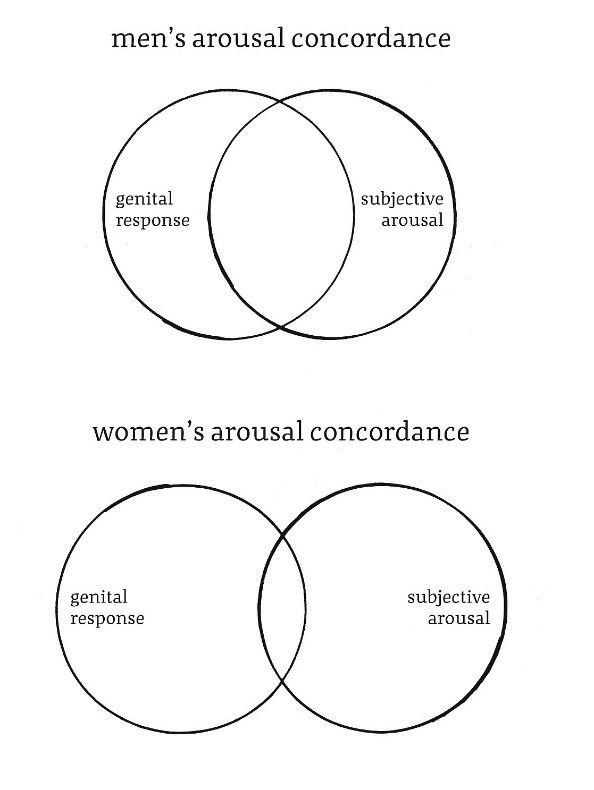I’m sure you’ve noticed that there’s a lot to know about sex and sexuality which wasn’t taught to us in sex-ed.
So here’s the most important lesson which I want you to prioritize explaining to your kids:

Nonconcordance
What’s that? It means two things don’t concord, they don’t go together. One does not signify or lead to the other.
In this case, we’re talking about arousal. Specifically, how aroused you feel vs. your genital response. Hardness and wetness means you’re aroused, right? Being aroused means you’re hard and wet, right?
Simply untrue. Dangerous over simplification, in fact.
Here’s the truth.

Sometimes how aroused you feel is not demonstrated by your genitals. Sometimes your genitals respond when you’re more No than Yes. One does not equal another, and the genitals certainly don’t trump how you’re feeling!
Therefore, we can’t assume we’re reading our partners correctly if the only information we have is from their genitals.
Want the scientific measurements? When the researchers attach instruments to the genitals and ask participants how aroused they are in response to a variety of stimuli, there’s 50% nonconcordance for men. It’s 90% nonconcordance for women.
Beyond that, when there is a genital response, in a sexual situation, that’s all it is. Think of it like yawning when someone else yawned, or scratching when someone else does. The body took in information and mirrored. There’s no particular meaning behind it. Just as you don’t have hypoxia (low oxygen) or a bug bite, a genital response doesn’t mean you “like” what’s happening.
This might seem like parsing hairs until we consider the consequences.
Consider the impact
- A girl’s sexual partner focuses on how wet she is, instead of her body language, facial expression, or words. The partner doesn’t check in verbally. Instead, when they’re ready for penetration, they assume she is too. There wasn’t enough foreplay and communication for her to enjoy the sex.
- Misconception: Wetness is not the same as enthusiastic consent.
- A man is asleep. A female acquaintance notices his erection and begins having sex with him. Upon waking, he feels violated. He later reports the incident as rape and is told that men can’t be raped.
- Misconception: Hardness is not the same as enthusiastic consent.
- A woman watches a violent scene in a movie and feels her genitals respond. She is horrified. She wonders if she’s sexually deviant or an immoral person.
- Misconception: Wetness is not the same as arousal. She’s not turned on by violence.
- A man witnesses a rape of an incapacitated person. His genitals respond. He is horrified. He is too overwhelmed with confusion and shame to intervene.
- Misconception: Hardness is not the same as arousal. He’s not turned on by rape.
- A preteen is fondled by a sexual predator. The adult uses the preteen’s erection as evidence that “he liked it.” The child is overwhelmed and confused.
- Misconception: Hardness is not the same as arousal. It’s not the same as consent.
Can you see the impact and real potential for harm in these oversimplifications?
Next steps
When I first read about nonconcordance, I was struck by the power of this one little piece of knowledge. The studies were done in the 70’s – we’ve known about it for 50 years – and yet, we’re talking about consent, consent, consent, without clearing up this very common wrong assumption.
How does this land for you? Does it change your understanding of yourself? Is it vindicating?
Does it change how you’ll talk with your child about sexual abuse? About porn? About sex?
I hope so. I’m convinced it’s a missing piece which will have great impact.
Now that you know, spread the word! Share this near and far.
In support of you,
Anya
P.S. This and much more is in Emily Nagoski’s book Come As You Are. Find that one and other recommended books on the Parent’s Books List.
P.P.S. There’s lots more for you on boundaries and consent in our video library. Check out the membership to gain access to over 80 webinars and expert interviews.












12 Comments. Leave new
Great read. Thanks & looking forward to what’s coming down the pipeline in the fall. Bravo!
Anya – this is so valuable to share with parents. I’d love to give parents a brief intro on NMG’s social media and then link them to your blog. OK ?
Absolutely!
Perfect timing for us
Thank you for sharing such great info
This is great info and needs to be shared with prosecutors as well.
Yes! And we need to know too, because we serve on the juries. Too often a victim’s genital response is cited as evidence of consent.
Wow, such valuable info! Thank you!
I am convinced lack of communication leads to problems, not only with sex, but other aspects of relationships in general. Biology is so often covered that the more esoteric aspects of sexuality are not even addressed, and that is just as important as the biology. My sister sent this to me because, and I quote her, “I admire her candor. I’ve read many of her blog posts and they are uniformly excellent. Thought this would be of interest to you, just on general principles.” She said she wished she had this available when her son was young (he is 32 now) as well as my father, who did his very best with us as far as sexual education, but could not articulate something like this – although, to his credit, he certainly tried. Thank you for being a realistic and sane voice in an ocean of insanity.
Awww, thank you! Yes, communication is the thing, 100%. We set many of those patterns in our families and so a lot of what I do with clients is communication skill building. I find people are pretty comfortable with biology, and have much more trouble with the how to communicate values and boundaries pieces. Being clear and succinct is a skill! I get to practice it regularly with blogs 🙂
Anya, I wonder how much of women’s genital response was tied to where they were in their cycle. Did the research talk about this? Obviously ‘wetness’ changes markedly throughout a woman’s cycle, stimuli or no, and I imagine most women respond, perhaps both physically and mentally, to stimuli more easily around the time of ovulation.
Yes, I think this is a big part of the explanation for women’s lower concordance.